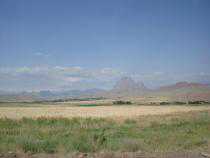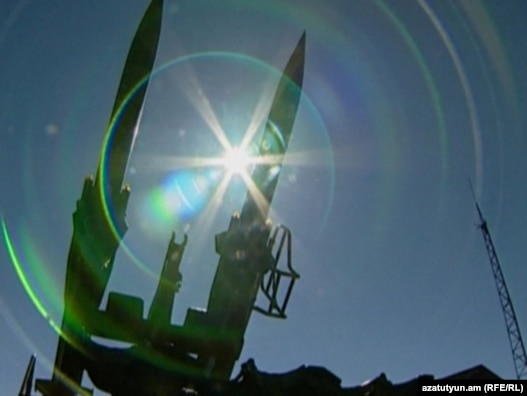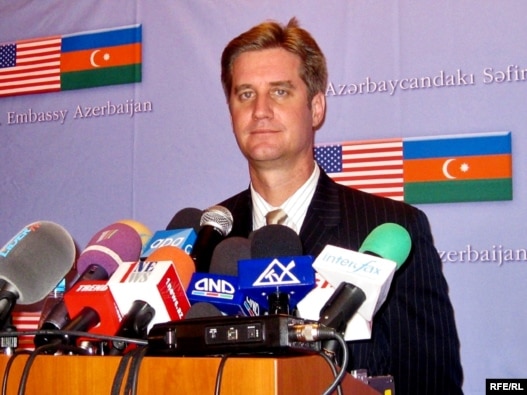We woke up late in the morning because we had got very tired the night before. The number of dreams we had seen for a couple of days increased dramatically. We were not yet fully relieved our tiredness. Until we met Karine at 13:00, we thought it is time to visit the internet world that we had neglected for a long time.
The morning in Yerevan is clear and brilliant. We are trying to find an internet café in Erebuni. Internet access in the café that we had gone the day before was a bit problematic. Watermelon sellers on the road, grocery stores under apartments and children playing on the puddles remind us the scenes from our own country. There is a map suspended on bus station. In the map the regions such as New Arapkir (Yeni Arapkir), New Malatya (Yeni Malatya), New Zeytun (Yeni Zeytun), New Maras (Yeni Maraş) draw our attention. In the country, foreign representation is highly valued. Whichever embassy building you come close on road, its existence is informed kilometers before. Moreover, in city maps on the bus stations designed by telephone operator firm Orange, embassy buildings are indicated.
We find a café on the road and sit there. After a while, the café owner turns the loud music and turns up sura in Koran. We are really surprised to experience such a situation. We wonder whether the café owner is Muslim. While going out of the café, we are again shocked to see the cross sign on his neck. The facilities that internet provides give interested people the opportunity to listen Koran suras and people are free to utilize this. Especially the Armenians who have lived in Syria are accustomed to this situation. While giving the internet pay, I accidentally take a Turk kurus out. The café owner says that that money is not valid there and I answered saying that is Turk money. With a smile on his face, he expresses his satisfaction: ‘’Welcome!…’’
Today we are going to see Tsitsernakaberd which underlies the Turkish-Armenian crisis and the commemoration of 1915. At the request of my friend Ismail, we scheduled this plan to an earlier time. We get in a taxi and proceed to the monument.
We have come to the monument. This monument is a place designed at one time conscientiously. The construction of the monument whose name means swallow nest started in 1966 to commemorate the 50. anniversary of 1915. 12 columns represent the 12 cities which Armenians migrated to from East Anatolia. The fire between the columns is designed in such a way that it never dies down. Under the monument there is a museum named as ‘’Genocide’’. Here, first we see ‘’1909 Adana Massacre’’ poster. There is an atmosphere created here to show as if Turkey, trying to cope with 31 March movement in 1909, stirred up the troubles in Adana. Our friend informs the officer the fact that we are Turks. With a look full of interest, he sends a translator to us. An attractive woman is trying to tell her national affairs to people who are members of the nation which carried out 1915 happenings to her own nation…
In the museum, in which there are some materials from the posters of Abdulhamit to the ones of Mustafa Kemal who is introduced as dictator and the main responsible of the Pontus genocide, and from the photos of Armenian kids with Cemal Pasha who killed many bandits to provide Armenians with comfort and facilities, to the German descriptions of Talat Pasha who is told as a killer, the translator goes on telling their national affairs with a great desire.
‘’Our ex-lands…’’ says the woman. ‘’Maras, Malatya, Diyarbakir, Mus, Van…’’ On these lands, Young Turks saw every kind of massacre as legal and were mobilized to kill Armenians for a reason that they did not even know. And they were successful…
The museum mirrors a humanitarian plight with the works of French and German painters and writers. Moreover, the book ‘’The Confession of a Good Turk’’ written by a Turk who have fled from Turkey to Germany is still on sale in this museum. The expression ‘’ To sacrifice 4 million souls’’ makes us realize how much affected are the people by the heavy propagandas. As understood from the sources there, these propagandas supported by European countries and Russia is arranged to use at anytime with the aim of creating a manageable power in Caucasia. I call this an externally-guide conversation because neither a Turk nor an Armenian has been able to form the basis for a meeting to discuss these issues. The main problem is the inability to discuss our own matters.
We ask the translator whether England, France and Russia are responsible for this situation. She says: ‘’ They were the forces against the Ottoman Empire and by war’s nature, they were the enemies. The responsibility belonged to Turks.’’ ‘’And Germany?’’ we say, because most of the materials in this museum are originating from Germany.’’ Yes…’’ she says, ‘’ They are partially responsible. Moreover, did not they take the inspiration of the genocide carried out on Jews from Turks?’’
After leaving the museum, we go on to see the monument. This monument is a place consisting of 12 columns and a fire that never dies down. With the blood and tears music played on the background, the environment here is rather gloomy. After a man with tears on his eyes leave the monument, we also go out to see the surrounding area of the monument. In the further park, there is a tree park consisting of trees which have been planted by the leaders around the world. The children of American ambassador Henry Morghenthau, who has a place on our minds with reporting against Turkey, have planted trees here.
After a little talk, we go to Erebuni, feeling hungry find a restaurant and sit there. Our friend says the the women working there that we are Turks. The woman is surprised and says that until that time she has never had a Turkish customer. Being Turkish here causes a short-term shock among people and that’s all…
We are looking at the menu to choose something to eat. As we go on looking, our astonishment increases because in menu there are the same dishes as in Turkey.
We order chicken shish and ‘’tan’’( ayran) as a beverage. During the meal, we talk about the similarities between Turk and Armenian culture. In Armenian language, there are lots of Turkish word. But the fact that these words have come from Turkish are not widely known there. The words such as ‘’Yaban, meydan, chardak, charshaf, yahudi, hach’’ are used in the same meaning in both languages.
When we say that in Armenian culture there are abduction of girls, coffee fortune-telling and asking for the girl in a marriage, Karine becomes both shocked and happy. The same fortune-telling conversations are also existent in their culture.
Our friend asks why there are many claims in Turkey against Armenians. We emphasize the fact that the situation is not what is thought and political problems create social problems. The family of our friend accepted our request to see them. They say after two days we can go to their country house. After leaving the restaurant, we are going towards the motel. All the way, we talk about Yerevan and the similarities between our languages.
I want to call some places with telephone. After telephone breaks down, the women working there goes and brings me another phone in a hurry. They are really warm and friendly people… (to be continued)
Mehmet Fatih ÖZTARSU / Caspian Weekly
Translated By : Yasemin Taşçı / Volunteer of TUIC





 Armenia — Surface-to-air missiles at a military base in Gyumri, undated
Armenia — Surface-to-air missiles at a military base in Gyumri, undated


 Azerbaijan — U.S. Deputy Assistant Secretary of State Matthew Bryza at a press-conference in Baku, 03Apr2009
Azerbaijan — U.S. Deputy Assistant Secretary of State Matthew Bryza at a press-conference in Baku, 03Apr2009
